Corporate Law: Effects of Mergers and Acquisitions on Competition
VerifiedAdded on 2022/10/08
|10
|1980
|16
Report
AI Summary
This report delves into the effects of mergers and acquisitions on market competition, analyzing the impact of such decisions on the economies of the US and El Salvador. It examines how antitrust laws and legal barriers influence market dynamics, using examples to illustrate ethical dilemmas, such as price manipulation and the formation of monopolies. The report discusses the potential adverse effects of mergers, including consumer confusion, reduced product variety, and the decline in quality due to a lack of competition, as well as the impact on small and medium-sized enterprises. It also explores the role of the Federal Trade Commission (FTC) in addressing unfair practices and the consequences of unethical behavior. The conclusion highlights the negative impacts of monopolies, including price fixing and the potential for sub-par products, emphasizing the importance of maintaining a competitive market to foster innovation and protect consumer interests.
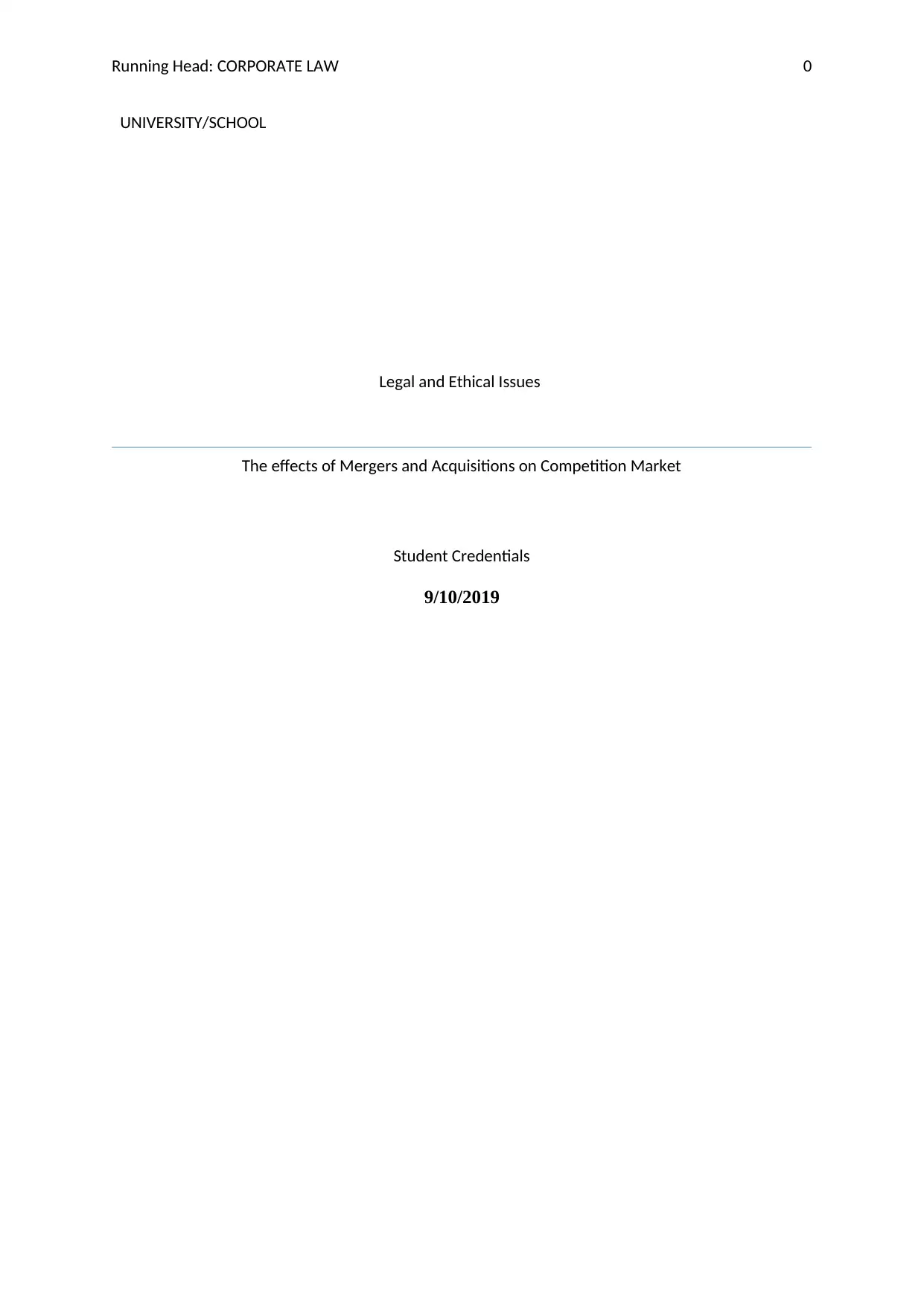
Running Head: CORPORATE LAW 0
UNIVERSITY/SCHOOL
Legal and Ethical Issues
The effects of Mergers and Acquisitions on Competition Market
Student Credentials
9/10/2019
UNIVERSITY/SCHOOL
Legal and Ethical Issues
The effects of Mergers and Acquisitions on Competition Market
Student Credentials
9/10/2019
Paraphrase This Document
Need a fresh take? Get an instant paraphrase of this document with our AI Paraphraser
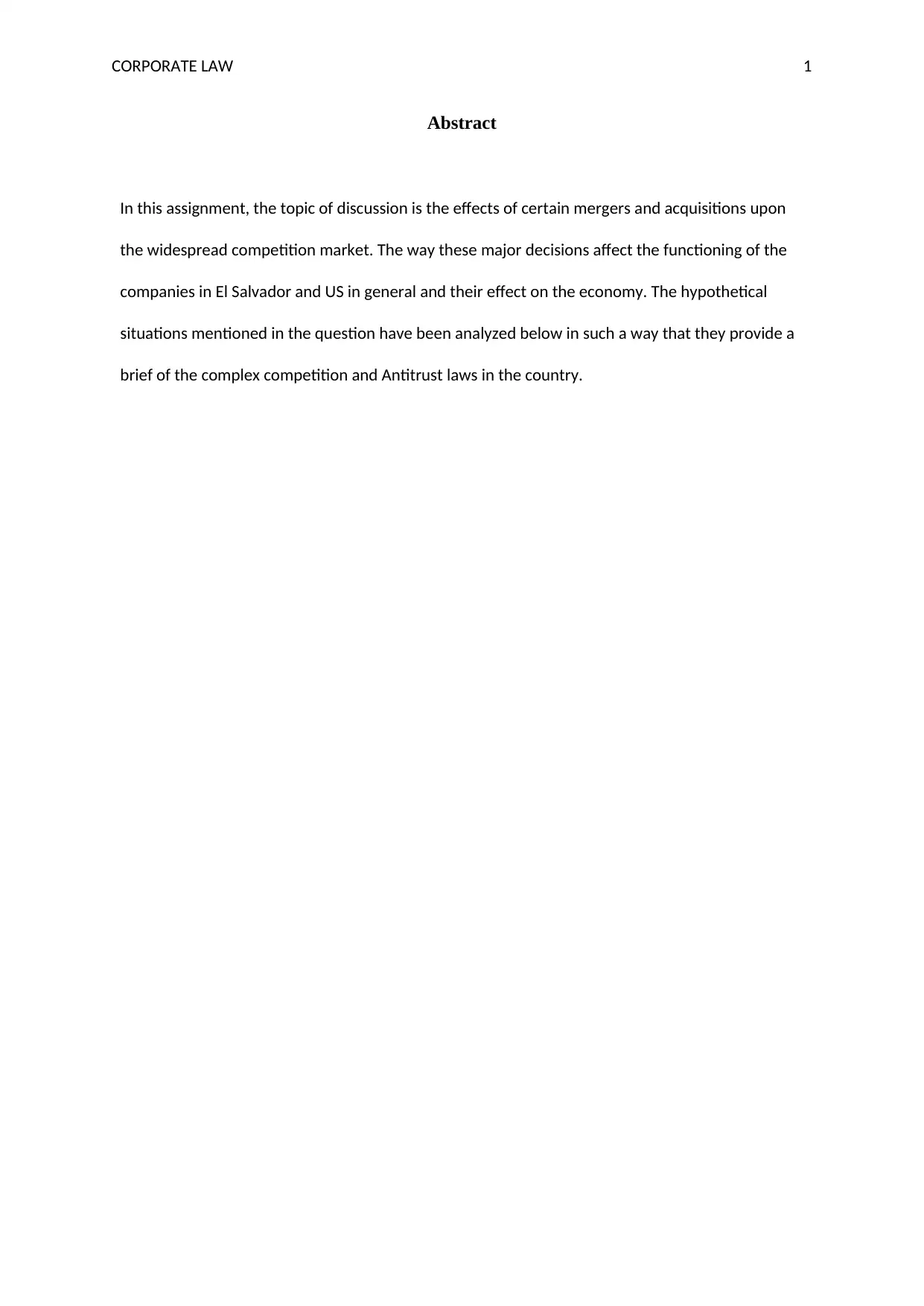
CORPORATE LAW 1
Abstract
In this assignment, the topic of discussion is the effects of certain mergers and acquisitions upon
the widespread competition market. The way these major decisions affect the functioning of the
companies in El Salvador and US in general and their effect on the economy. The hypothetical
situations mentioned in the question have been analyzed below in such a way that they provide a
brief of the complex competition and Antitrust laws in the country.
Abstract
In this assignment, the topic of discussion is the effects of certain mergers and acquisitions upon
the widespread competition market. The way these major decisions affect the functioning of the
companies in El Salvador and US in general and their effect on the economy. The hypothetical
situations mentioned in the question have been analyzed below in such a way that they provide a
brief of the complex competition and Antitrust laws in the country.
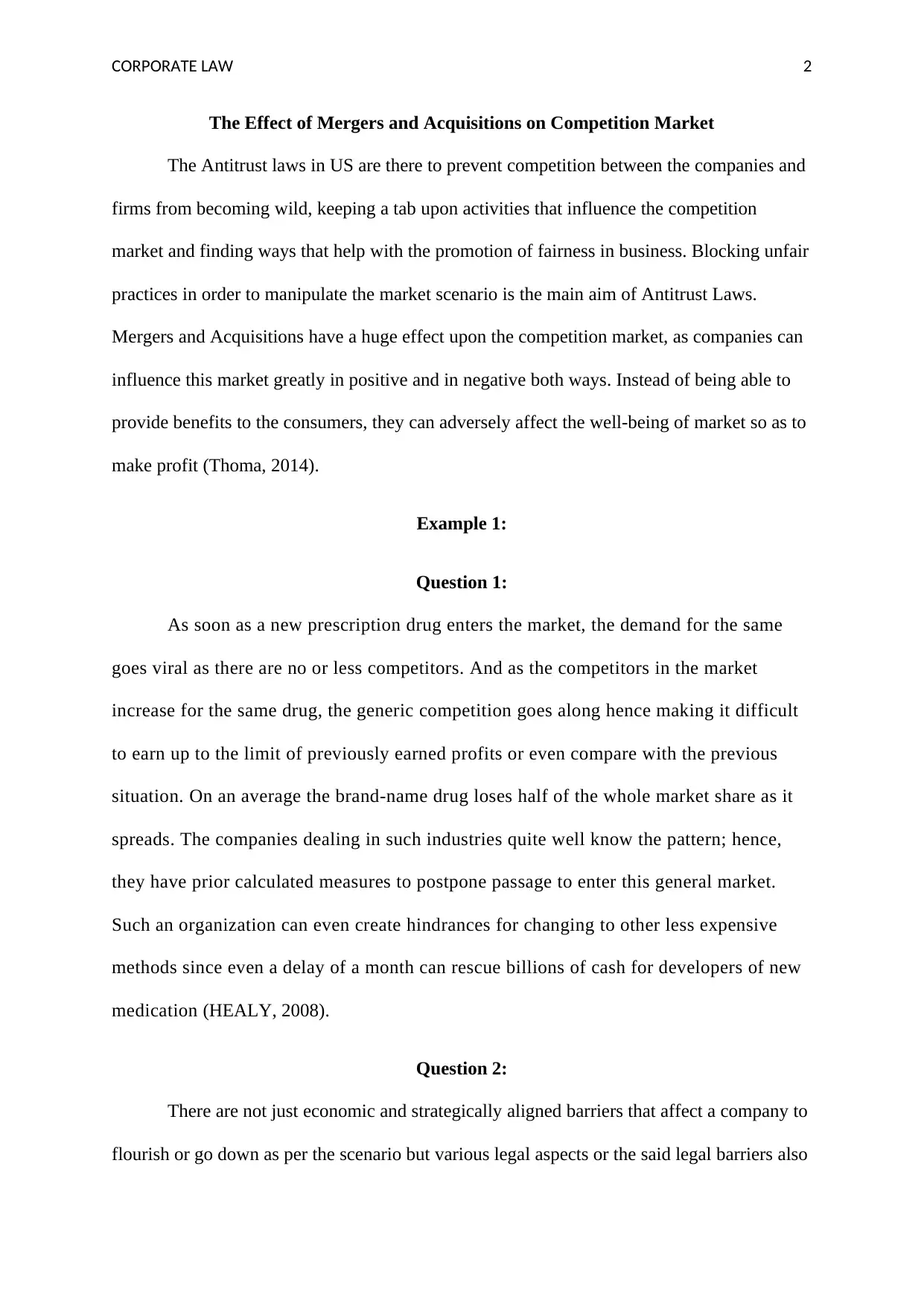
CORPORATE LAW 2
The Effect of Mergers and Acquisitions on Competition Market
The Antitrust laws in US are there to prevent competition between the companies and
firms from becoming wild, keeping a tab upon activities that influence the competition
market and finding ways that help with the promotion of fairness in business. Blocking unfair
practices in order to manipulate the market scenario is the main aim of Antitrust Laws.
Mergers and Acquisitions have a huge effect upon the competition market, as companies can
influence this market greatly in positive and in negative both ways. Instead of being able to
provide benefits to the consumers, they can adversely affect the well-being of market so as to
make profit (Thoma, 2014).
Example 1:
Question 1:
As soon as a new prescription drug enters the market, the demand for the same
goes viral as there are no or less competitors. And as the competitors in the market
increase for the same drug, the generic competition goes along hence making it difficult
to earn up to the limit of previously earned profits or even compare with the previous
situation. On an average the brand-name drug loses half of the whole market share as it
spreads. The companies dealing in such industries quite well know the pattern; hence,
they have prior calculated measures to postpone passage to enter this general market.
Such an organization can even create hindrances for changing to other less expensive
methods since even a delay of a month can rescue billions of cash for developers of new
medication (HEALY, 2008).
Question 2:
There are not just economic and strategically aligned barriers that affect a company to
flourish or go down as per the scenario but various legal aspects or the said legal barriers also
The Effect of Mergers and Acquisitions on Competition Market
The Antitrust laws in US are there to prevent competition between the companies and
firms from becoming wild, keeping a tab upon activities that influence the competition
market and finding ways that help with the promotion of fairness in business. Blocking unfair
practices in order to manipulate the market scenario is the main aim of Antitrust Laws.
Mergers and Acquisitions have a huge effect upon the competition market, as companies can
influence this market greatly in positive and in negative both ways. Instead of being able to
provide benefits to the consumers, they can adversely affect the well-being of market so as to
make profit (Thoma, 2014).
Example 1:
Question 1:
As soon as a new prescription drug enters the market, the demand for the same
goes viral as there are no or less competitors. And as the competitors in the market
increase for the same drug, the generic competition goes along hence making it difficult
to earn up to the limit of previously earned profits or even compare with the previous
situation. On an average the brand-name drug loses half of the whole market share as it
spreads. The companies dealing in such industries quite well know the pattern; hence,
they have prior calculated measures to postpone passage to enter this general market.
Such an organization can even create hindrances for changing to other less expensive
methods since even a delay of a month can rescue billions of cash for developers of new
medication (HEALY, 2008).
Question 2:
There are not just economic and strategically aligned barriers that affect a company to
flourish or go down as per the scenario but various legal aspects or the said legal barriers also
⊘ This is a preview!⊘
Do you want full access?
Subscribe today to unlock all pages.

Trusted by 1+ million students worldwide
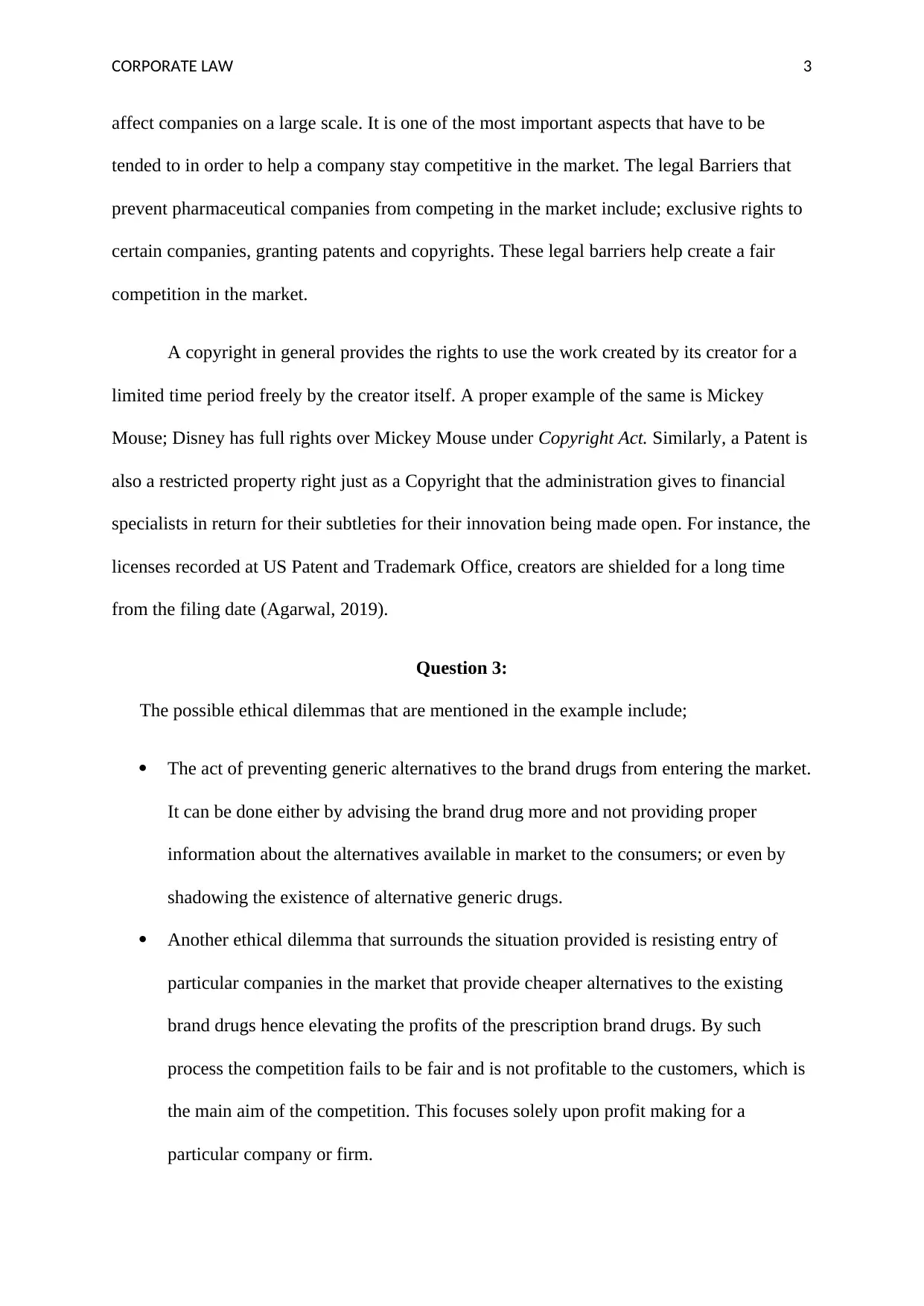
CORPORATE LAW 3
affect companies on a large scale. It is one of the most important aspects that have to be
tended to in order to help a company stay competitive in the market. The legal Barriers that
prevent pharmaceutical companies from competing in the market include; exclusive rights to
certain companies, granting patents and copyrights. These legal barriers help create a fair
competition in the market.
A copyright in general provides the rights to use the work created by its creator for a
limited time period freely by the creator itself. A proper example of the same is Mickey
Mouse; Disney has full rights over Mickey Mouse under Copyright Act. Similarly, a Patent is
also a restricted property right just as a Copyright that the administration gives to financial
specialists in return for their subtleties for their innovation being made open. For instance, the
licenses recorded at US Patent and Trademark Office, creators are shielded for a long time
from the filing date (Agarwal, 2019).
Question 3:
The possible ethical dilemmas that are mentioned in the example include;
The act of preventing generic alternatives to the brand drugs from entering the market.
It can be done either by advising the brand drug more and not providing proper
information about the alternatives available in market to the consumers; or even by
shadowing the existence of alternative generic drugs.
Another ethical dilemma that surrounds the situation provided is resisting entry of
particular companies in the market that provide cheaper alternatives to the existing
brand drugs hence elevating the profits of the prescription brand drugs. By such
process the competition fails to be fair and is not profitable to the customers, which is
the main aim of the competition. This focuses solely upon profit making for a
particular company or firm.
affect companies on a large scale. It is one of the most important aspects that have to be
tended to in order to help a company stay competitive in the market. The legal Barriers that
prevent pharmaceutical companies from competing in the market include; exclusive rights to
certain companies, granting patents and copyrights. These legal barriers help create a fair
competition in the market.
A copyright in general provides the rights to use the work created by its creator for a
limited time period freely by the creator itself. A proper example of the same is Mickey
Mouse; Disney has full rights over Mickey Mouse under Copyright Act. Similarly, a Patent is
also a restricted property right just as a Copyright that the administration gives to financial
specialists in return for their subtleties for their innovation being made open. For instance, the
licenses recorded at US Patent and Trademark Office, creators are shielded for a long time
from the filing date (Agarwal, 2019).
Question 3:
The possible ethical dilemmas that are mentioned in the example include;
The act of preventing generic alternatives to the brand drugs from entering the market.
It can be done either by advising the brand drug more and not providing proper
information about the alternatives available in market to the consumers; or even by
shadowing the existence of alternative generic drugs.
Another ethical dilemma that surrounds the situation provided is resisting entry of
particular companies in the market that provide cheaper alternatives to the existing
brand drugs hence elevating the profits of the prescription brand drugs. By such
process the competition fails to be fair and is not profitable to the customers, which is
the main aim of the competition. This focuses solely upon profit making for a
particular company or firm.
Paraphrase This Document
Need a fresh take? Get an instant paraphrase of this document with our AI Paraphraser
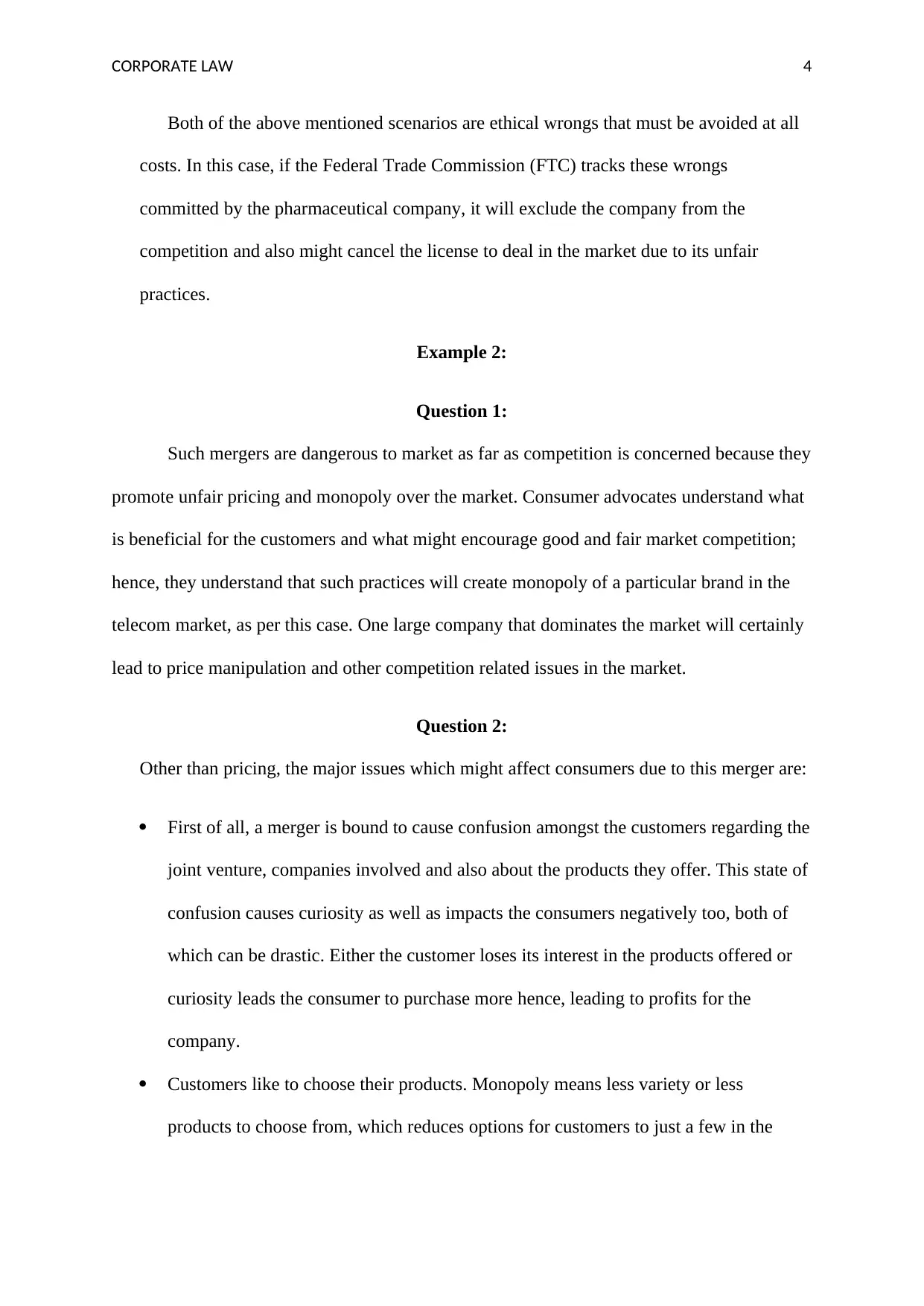
CORPORATE LAW 4
Both of the above mentioned scenarios are ethical wrongs that must be avoided at all
costs. In this case, if the Federal Trade Commission (FTC) tracks these wrongs
committed by the pharmaceutical company, it will exclude the company from the
competition and also might cancel the license to deal in the market due to its unfair
practices.
Example 2:
Question 1:
Such mergers are dangerous to market as far as competition is concerned because they
promote unfair pricing and monopoly over the market. Consumer advocates understand what
is beneficial for the customers and what might encourage good and fair market competition;
hence, they understand that such practices will create monopoly of a particular brand in the
telecom market, as per this case. One large company that dominates the market will certainly
lead to price manipulation and other competition related issues in the market.
Question 2:
Other than pricing, the major issues which might affect consumers due to this merger are:
First of all, a merger is bound to cause confusion amongst the customers regarding the
joint venture, companies involved and also about the products they offer. This state of
confusion causes curiosity as well as impacts the consumers negatively too, both of
which can be drastic. Either the customer loses its interest in the products offered or
curiosity leads the consumer to purchase more hence, leading to profits for the
company.
Customers like to choose their products. Monopoly means less variety or less
products to choose from, which reduces options for customers to just a few in the
Both of the above mentioned scenarios are ethical wrongs that must be avoided at all
costs. In this case, if the Federal Trade Commission (FTC) tracks these wrongs
committed by the pharmaceutical company, it will exclude the company from the
competition and also might cancel the license to deal in the market due to its unfair
practices.
Example 2:
Question 1:
Such mergers are dangerous to market as far as competition is concerned because they
promote unfair pricing and monopoly over the market. Consumer advocates understand what
is beneficial for the customers and what might encourage good and fair market competition;
hence, they understand that such practices will create monopoly of a particular brand in the
telecom market, as per this case. One large company that dominates the market will certainly
lead to price manipulation and other competition related issues in the market.
Question 2:
Other than pricing, the major issues which might affect consumers due to this merger are:
First of all, a merger is bound to cause confusion amongst the customers regarding the
joint venture, companies involved and also about the products they offer. This state of
confusion causes curiosity as well as impacts the consumers negatively too, both of
which can be drastic. Either the customer loses its interest in the products offered or
curiosity leads the consumer to purchase more hence, leading to profits for the
company.
Customers like to choose their products. Monopoly means less variety or less
products to choose from, which reduces options for customers to just a few in the
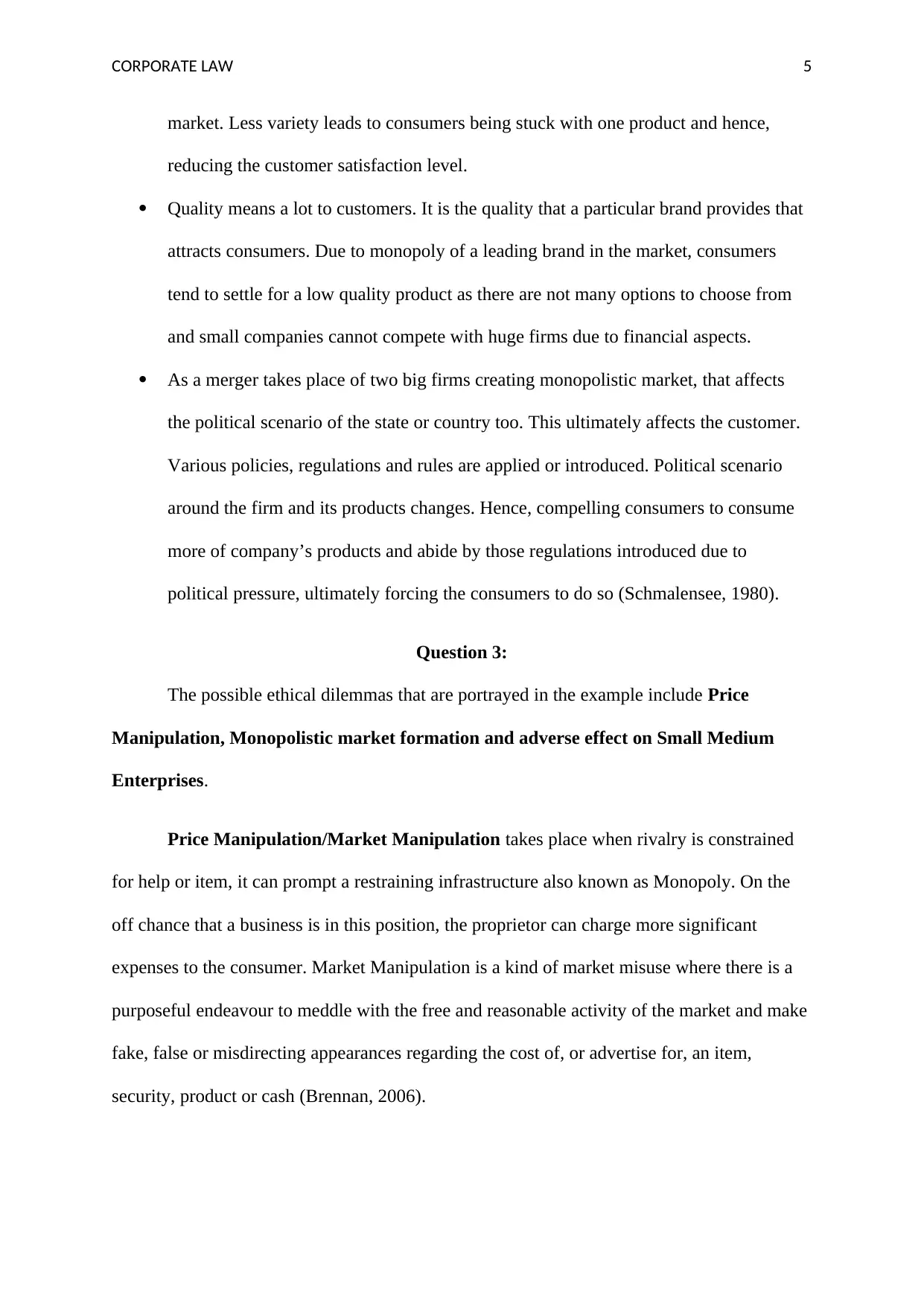
CORPORATE LAW 5
market. Less variety leads to consumers being stuck with one product and hence,
reducing the customer satisfaction level.
Quality means a lot to customers. It is the quality that a particular brand provides that
attracts consumers. Due to monopoly of a leading brand in the market, consumers
tend to settle for a low quality product as there are not many options to choose from
and small companies cannot compete with huge firms due to financial aspects.
As a merger takes place of two big firms creating monopolistic market, that affects
the political scenario of the state or country too. This ultimately affects the customer.
Various policies, regulations and rules are applied or introduced. Political scenario
around the firm and its products changes. Hence, compelling consumers to consume
more of company’s products and abide by those regulations introduced due to
political pressure, ultimately forcing the consumers to do so (Schmalensee, 1980).
Question 3:
The possible ethical dilemmas that are portrayed in the example include Price
Manipulation, Monopolistic market formation and adverse effect on Small Medium
Enterprises.
Price Manipulation/Market Manipulation takes place when rivalry is constrained
for help or item, it can prompt a restraining infrastructure also known as Monopoly. On the
off chance that a business is in this position, the proprietor can charge more significant
expenses to the consumer. Market Manipulation is a kind of market misuse where there is a
purposeful endeavour to meddle with the free and reasonable activity of the market and make
fake, false or misdirecting appearances regarding the cost of, or advertise for, an item,
security, product or cash (Brennan, 2006).
market. Less variety leads to consumers being stuck with one product and hence,
reducing the customer satisfaction level.
Quality means a lot to customers. It is the quality that a particular brand provides that
attracts consumers. Due to monopoly of a leading brand in the market, consumers
tend to settle for a low quality product as there are not many options to choose from
and small companies cannot compete with huge firms due to financial aspects.
As a merger takes place of two big firms creating monopolistic market, that affects
the political scenario of the state or country too. This ultimately affects the customer.
Various policies, regulations and rules are applied or introduced. Political scenario
around the firm and its products changes. Hence, compelling consumers to consume
more of company’s products and abide by those regulations introduced due to
political pressure, ultimately forcing the consumers to do so (Schmalensee, 1980).
Question 3:
The possible ethical dilemmas that are portrayed in the example include Price
Manipulation, Monopolistic market formation and adverse effect on Small Medium
Enterprises.
Price Manipulation/Market Manipulation takes place when rivalry is constrained
for help or item, it can prompt a restraining infrastructure also known as Monopoly. On the
off chance that a business is in this position, the proprietor can charge more significant
expenses to the consumer. Market Manipulation is a kind of market misuse where there is a
purposeful endeavour to meddle with the free and reasonable activity of the market and make
fake, false or misdirecting appearances regarding the cost of, or advertise for, an item,
security, product or cash (Brennan, 2006).
⊘ This is a preview!⊘
Do you want full access?
Subscribe today to unlock all pages.

Trusted by 1+ million students worldwide
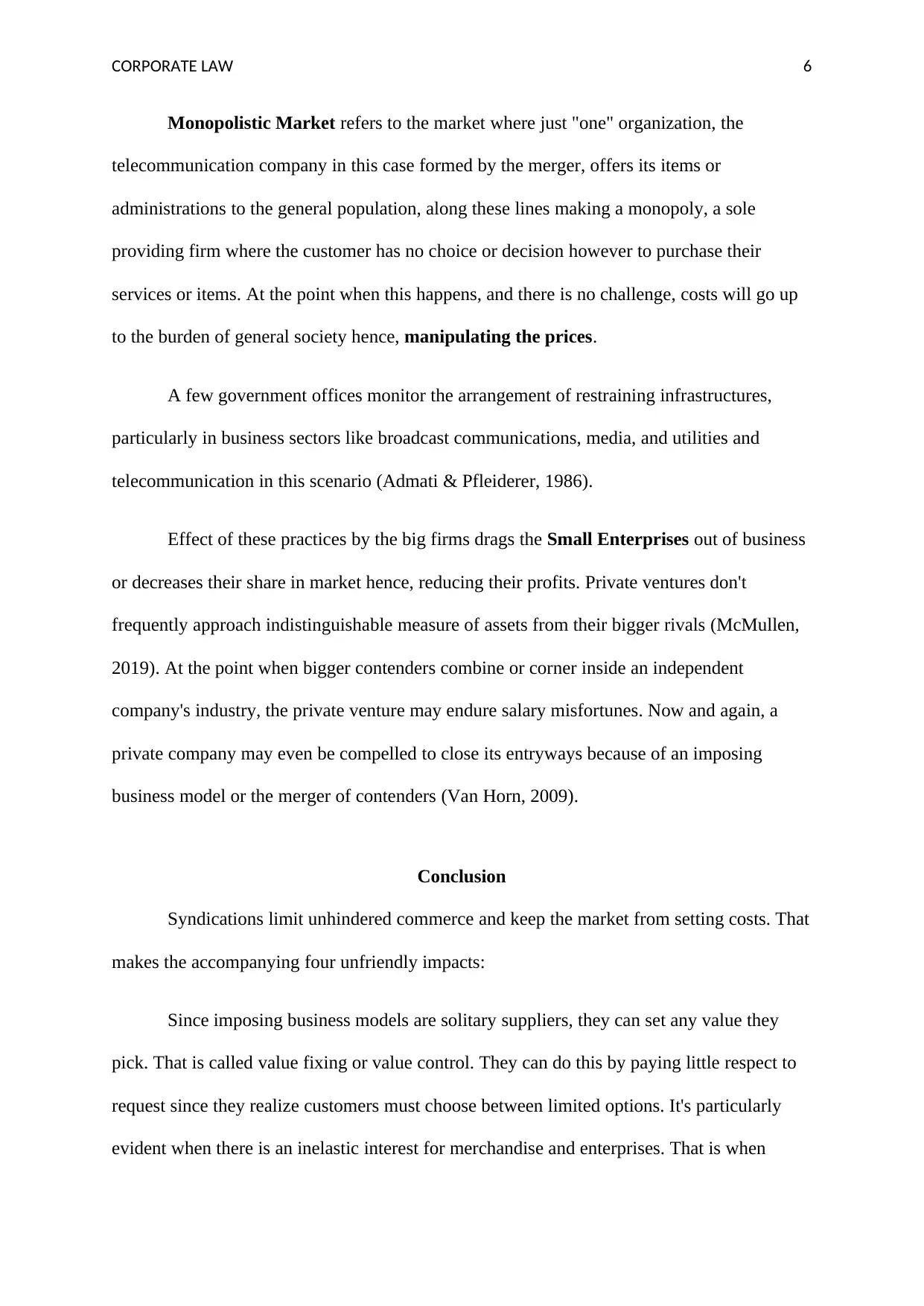
CORPORATE LAW 6
Monopolistic Market refers to the market where just "one" organization, the
telecommunication company in this case formed by the merger, offers its items or
administrations to the general population, along these lines making a monopoly, a sole
providing firm where the customer has no choice or decision however to purchase their
services or items. At the point when this happens, and there is no challenge, costs will go up
to the burden of general society hence, manipulating the prices.
A few government offices monitor the arrangement of restraining infrastructures,
particularly in business sectors like broadcast communications, media, and utilities and
telecommunication in this scenario (Admati & Pfleiderer, 1986).
Effect of these practices by the big firms drags the Small Enterprises out of business
or decreases their share in market hence, reducing their profits. Private ventures don't
frequently approach indistinguishable measure of assets from their bigger rivals (McMullen,
2019). At the point when bigger contenders combine or corner inside an independent
company's industry, the private venture may endure salary misfortunes. Now and again, a
private company may even be compelled to close its entryways because of an imposing
business model or the merger of contenders (Van Horn, 2009).
Conclusion
Syndications limit unhindered commerce and keep the market from setting costs. That
makes the accompanying four unfriendly impacts:
Since imposing business models are solitary suppliers, they can set any value they
pick. That is called value fixing or value control. They can do this by paying little respect to
request since they realize customers must choose between limited options. It's particularly
evident when there is an inelastic interest for merchandise and enterprises. That is when
Monopolistic Market refers to the market where just "one" organization, the
telecommunication company in this case formed by the merger, offers its items or
administrations to the general population, along these lines making a monopoly, a sole
providing firm where the customer has no choice or decision however to purchase their
services or items. At the point when this happens, and there is no challenge, costs will go up
to the burden of general society hence, manipulating the prices.
A few government offices monitor the arrangement of restraining infrastructures,
particularly in business sectors like broadcast communications, media, and utilities and
telecommunication in this scenario (Admati & Pfleiderer, 1986).
Effect of these practices by the big firms drags the Small Enterprises out of business
or decreases their share in market hence, reducing their profits. Private ventures don't
frequently approach indistinguishable measure of assets from their bigger rivals (McMullen,
2019). At the point when bigger contenders combine or corner inside an independent
company's industry, the private venture may endure salary misfortunes. Now and again, a
private company may even be compelled to close its entryways because of an imposing
business model or the merger of contenders (Van Horn, 2009).
Conclusion
Syndications limit unhindered commerce and keep the market from setting costs. That
makes the accompanying four unfriendly impacts:
Since imposing business models are solitary suppliers, they can set any value they
pick. That is called value fixing or value control. They can do this by paying little respect to
request since they realize customers must choose between limited options. It's particularly
evident when there is an inelastic interest for merchandise and enterprises. That is when
Paraphrase This Document
Need a fresh take? Get an instant paraphrase of this document with our AI Paraphraser
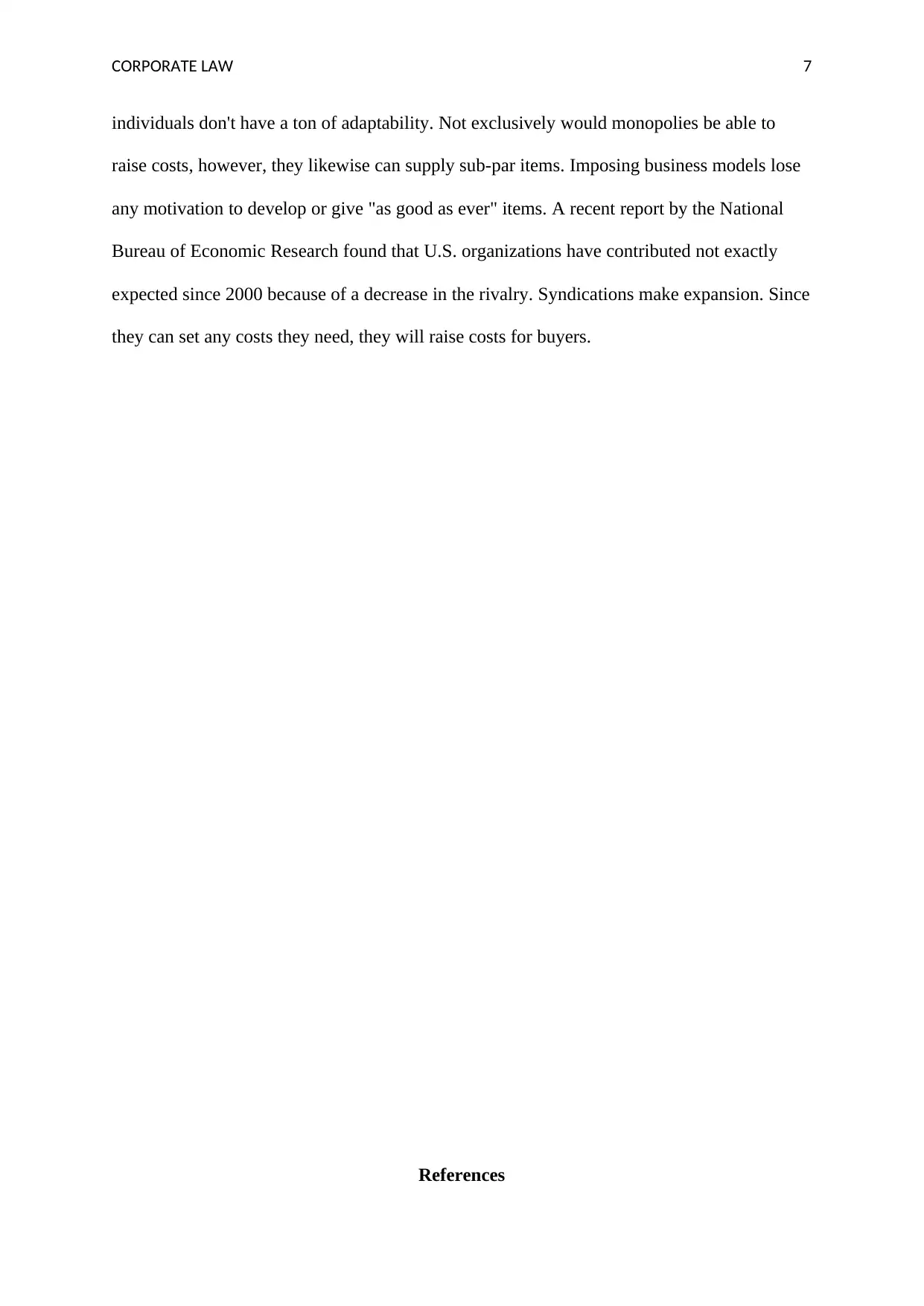
CORPORATE LAW 7
individuals don't have a ton of adaptability. Not exclusively would monopolies be able to
raise costs, however, they likewise can supply sub-par items. Imposing business models lose
any motivation to develop or give "as good as ever" items. A recent report by the National
Bureau of Economic Research found that U.S. organizations have contributed not exactly
expected since 2000 because of a decrease in the rivalry. Syndications make expansion. Since
they can set any costs they need, they will raise costs for buyers.
References
individuals don't have a ton of adaptability. Not exclusively would monopolies be able to
raise costs, however, they likewise can supply sub-par items. Imposing business models lose
any motivation to develop or give "as good as ever" items. A recent report by the National
Bureau of Economic Research found that U.S. organizations have contributed not exactly
expected since 2000 because of a decrease in the rivalry. Syndications make expansion. Since
they can set any costs they need, they will raise costs for buyers.
References
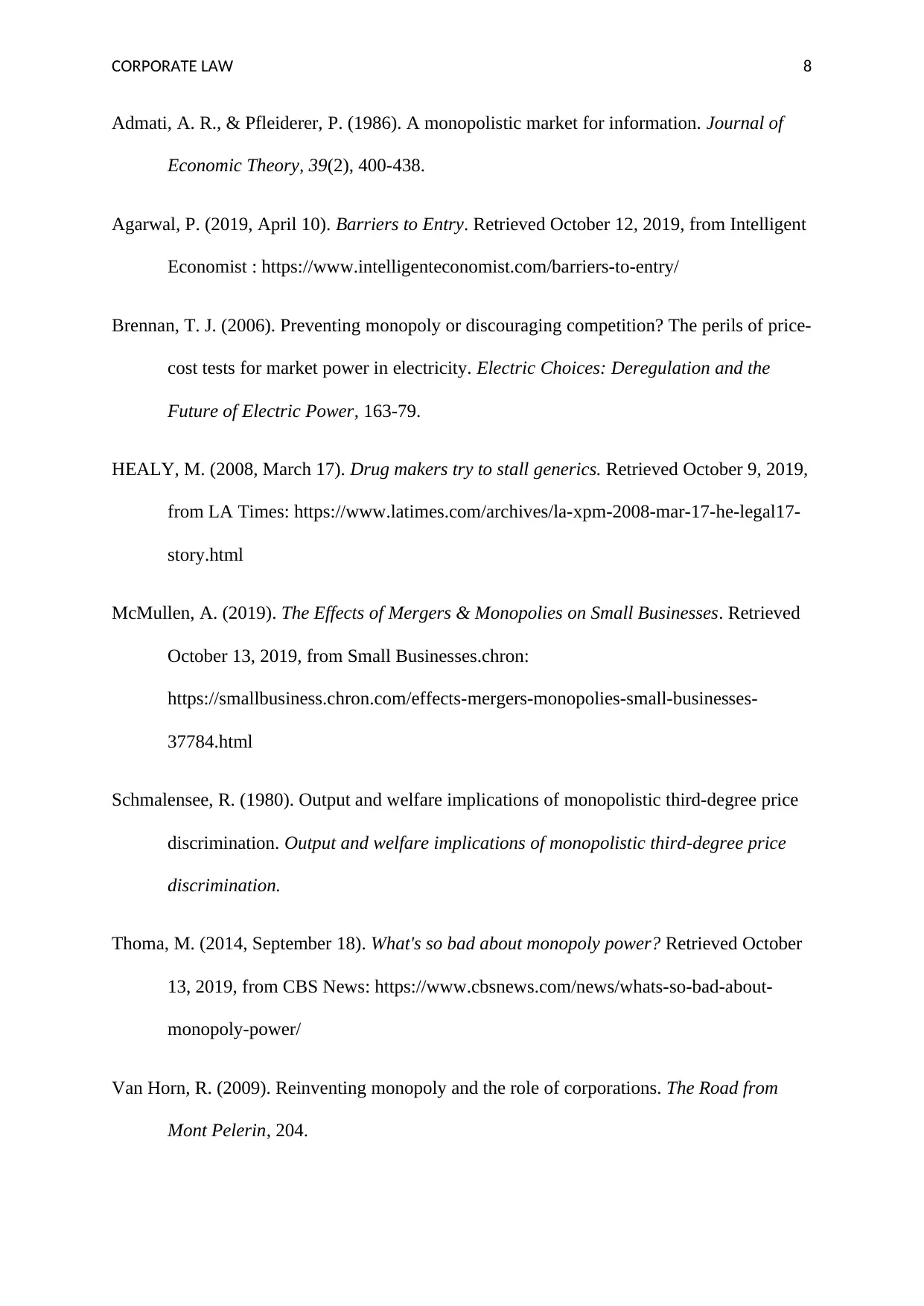
CORPORATE LAW 8
Admati, A. R., & Pfleiderer, P. (1986). A monopolistic market for information. Journal of
Economic Theory, 39(2), 400-438.
Agarwal, P. (2019, April 10). Barriers to Entry. Retrieved October 12, 2019, from Intelligent
Economist : https://www.intelligenteconomist.com/barriers-to-entry/
Brennan, T. J. (2006). Preventing monopoly or discouraging competition? The perils of price-
cost tests for market power in electricity. Electric Choices: Deregulation and the
Future of Electric Power, 163-79.
HEALY, M. (2008, March 17). Drug makers try to stall generics. Retrieved October 9, 2019,
from LA Times: https://www.latimes.com/archives/la-xpm-2008-mar-17-he-legal17-
story.html
McMullen, A. (2019). The Effects of Mergers & Monopolies on Small Businesses. Retrieved
October 13, 2019, from Small Businesses.chron:
https://smallbusiness.chron.com/effects-mergers-monopolies-small-businesses-
37784.html
Schmalensee, R. (1980). Output and welfare implications of monopolistic third-degree price
discrimination. Output and welfare implications of monopolistic third-degree price
discrimination.
Thoma, M. (2014, September 18). What's so bad about monopoly power? Retrieved October
13, 2019, from CBS News: https://www.cbsnews.com/news/whats-so-bad-about-
monopoly-power/
Van Horn, R. (2009). Reinventing monopoly and the role of corporations. The Road from
Mont Pelerin, 204.
Admati, A. R., & Pfleiderer, P. (1986). A monopolistic market for information. Journal of
Economic Theory, 39(2), 400-438.
Agarwal, P. (2019, April 10). Barriers to Entry. Retrieved October 12, 2019, from Intelligent
Economist : https://www.intelligenteconomist.com/barriers-to-entry/
Brennan, T. J. (2006). Preventing monopoly or discouraging competition? The perils of price-
cost tests for market power in electricity. Electric Choices: Deregulation and the
Future of Electric Power, 163-79.
HEALY, M. (2008, March 17). Drug makers try to stall generics. Retrieved October 9, 2019,
from LA Times: https://www.latimes.com/archives/la-xpm-2008-mar-17-he-legal17-
story.html
McMullen, A. (2019). The Effects of Mergers & Monopolies on Small Businesses. Retrieved
October 13, 2019, from Small Businesses.chron:
https://smallbusiness.chron.com/effects-mergers-monopolies-small-businesses-
37784.html
Schmalensee, R. (1980). Output and welfare implications of monopolistic third-degree price
discrimination. Output and welfare implications of monopolistic third-degree price
discrimination.
Thoma, M. (2014, September 18). What's so bad about monopoly power? Retrieved October
13, 2019, from CBS News: https://www.cbsnews.com/news/whats-so-bad-about-
monopoly-power/
Van Horn, R. (2009). Reinventing monopoly and the role of corporations. The Road from
Mont Pelerin, 204.
⊘ This is a preview!⊘
Do you want full access?
Subscribe today to unlock all pages.

Trusted by 1+ million students worldwide

CORPORATE LAW 9
1 out of 10
Related Documents
Your All-in-One AI-Powered Toolkit for Academic Success.
+13062052269
info@desklib.com
Available 24*7 on WhatsApp / Email
![[object Object]](/_next/static/media/star-bottom.7253800d.svg)
Unlock your academic potential
Copyright © 2020–2025 A2Z Services. All Rights Reserved. Developed and managed by ZUCOL.



